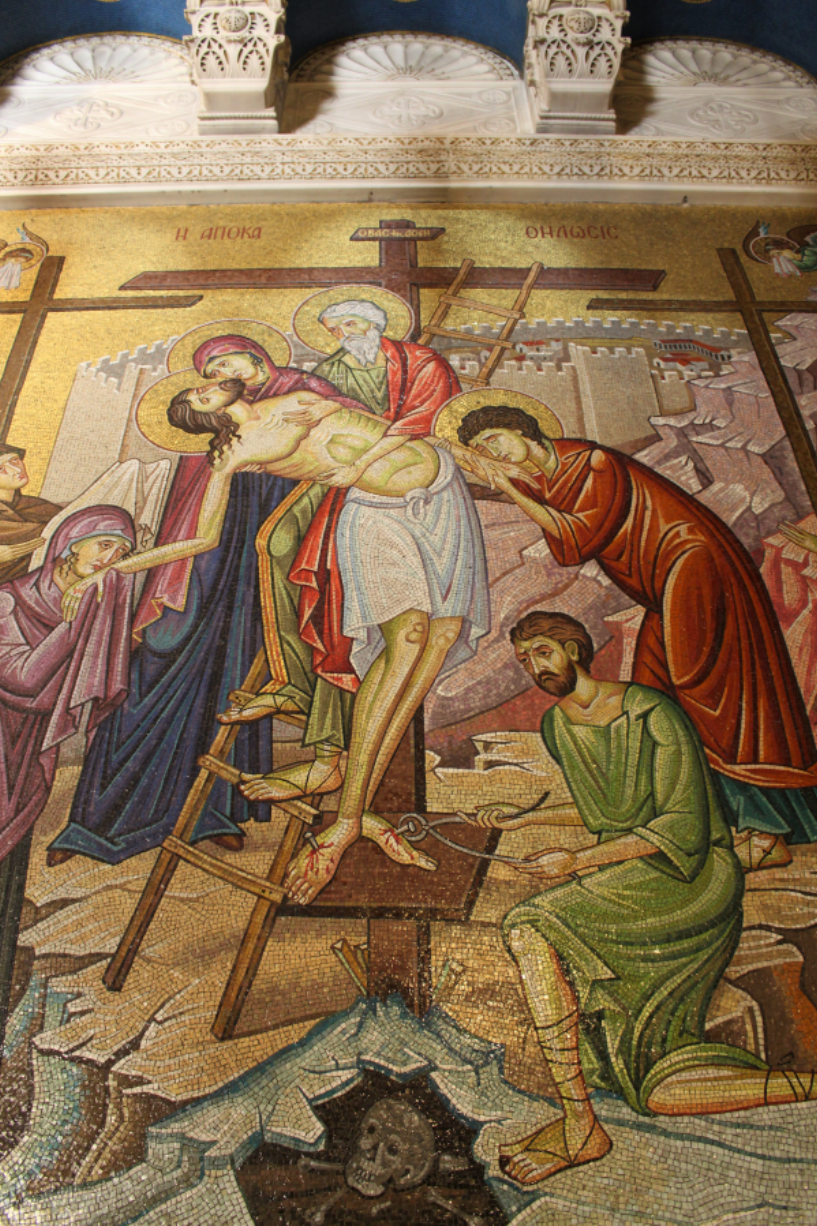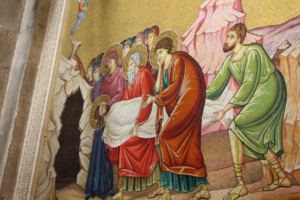
Matthew 27: 32-61
32 As they went out, they came upon a man from Cyrene named Simon; they compelled this man to carry his cross. And when they came to a place called Golgotha (which means Place of a Skull), they offered him wine to drink, mixed with gall; but when he tasted it, he would not drink it. And when they had crucified him, they divided his clothes among themselves by casting lots; then they sat down there and kept watch over him. Over his head they put the charge against him, which read, “This is Jesus, the King of the Jews.”
38 Then two bandits were crucified with him, one on his right and one on his left. Those who passed by derided him, shaking their heads and saying, “You who would destroy the temple and build it in three days, save yourself! If you are the Son of God, come down from the cross.” In the same way the chief priests also, along with the scribes and elders, were mocking him, saying, “He saved others; he cannot save himself. He is the King of Israel; let him come down from the cross now, and we will believe in him. He trusts in God; let God deliver him now, if he wants to; for he said, ‘I am God’s Son.’” The bandits who were crucified with him also taunted him in the same way.
45 From noon on, darkness came over the whole land until three in the afternoon. And about three o’clock Jesus cried with a loud voice, “Eli, Eli, lema sabachthani?” that is, “My God, my God, why have you forsaken me?” When some of the bystanders heard it, they said, “This man is calling for Elijah.” At once one of them ran and got a sponge, filled it with sour wine, put it on a stick, and gave it to him to drink. But the others said, “Wait, let us see whether Elijah will come to save him.” Then Jesus cried again with a loud voice and breathed his last. At that moment the curtain of the temple was torn in two, from top to bottom. The earth shook, and the rocks were split. The tombs also were opened, and many bodies of the saints who had fallen asleep were raised. After his resurrection they came out of the tombs and entered the holy city and appeared to many. Now when the centurion and those with him, who were keeping watch over Jesus, saw the earthquake and what took place, they were terrified and said, “Truly this man was God’s Son!”
55 Many women were also there, looking on from a distance; they had followed Jesus from Galilee and had provided for him. Among them were Mary Magdalene, and Mary the mother of James and Joseph, and the mother of the sons of Zebedee.
57 When it was evening, there came a rich man from Arimathea, named Joseph, who was also a disciple of Jesus. He went to Pilate and asked for the body of Jesus; then Pilate ordered it to be given to him. So Joseph took the body and wrapped it in a clean linen cloth and laid it in his own new tomb, which he had hewn in the rock. He then rolled a great stone to the door of the tomb and went away. Mary Magdalene and the other Mary were there, sitting opposite the tomb.
Jesus has suffered and continues to suffer as he makes his way to the place of crucifixion. Simon of Cyrene, an outsider, and Gentile is forced to carry his cross: a moment pointing us to understand that the Savior’s death is for all people, not just the Jews.
Jesus experiences suffering and pain in crucifixion; such that we can not even comprehend. The sinless Son of God, present at creation, born as a human baby; teacher, healer, lover of all people no matter their sins or past or present, dies. He dies while people walking by deride him, while the whole Sanhedrin (chief priests, scribes, and elders) join in the taunting, as well as the robbers being crucified with him. Those watching and jeering believe he is dying alone and abandoned particularly when they hear him cry out, “Eli, Eli, lema sabachthani?” that is, “My God, my God, why have you forsaken me?” But they miss something: Jesus says to God, “my God”. He may be the only one hanging on that cross and his followers may have deserted him or been standing at a distance, but he calls out to his God: those are not words of despair. They are words of knowing the source of everything. Those are words of connection and presence. Our Savior in his human physical pain cries out but looks to his God; to our God.
In our pain and suffering, to whom do we cry out? And how do we cry out? Do we cry out to the source of life and love? In those moments, do I know am God’s child? And that even in my suffering, God has not abandoned me? And perhaps even God suffers along with me?
My mom passed away over a year ago and I am still caught off guard by some moments of grief. Even though I know Mom is rejoicing with Jesus in the presence of God at this very moment, I still have moments of profound grief. I wonder if God still experiences moments of profound grief over Christ’s suffering for us even as Jesus sits at God’s right hand?
We are fortunate that we know resurrection is just days away. Those who deserted Jesus, those standing at a distance, and many more in our scriptures did not and for them today is a day of deep despair and confusion. Some, like the guards, came to realize Jesus is God’s son and most likely experienced confusion trying make sense of what they had witnessed that day.
Jesus is given a place for burial by Joseph of Arimathea. His body is taken down from the cross, wrapped, placed in the tomb, and a stone is rolled to close off the tomb. The two Mary’s sit and watch and wait.
May we this day grieve the death of our Savior. May we proclaim he is the Son of God. May we watch and wait.

Seeing With Light | All Rights Reserved.